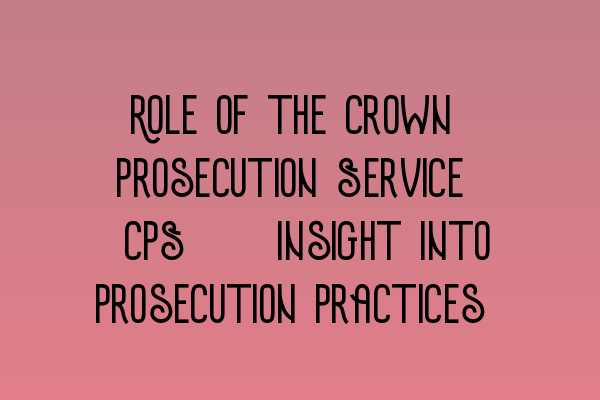Role of the Crown Prosecution Service (CPS): Insight into Prosecution Practices
Welcome to SQE Criminal Law & Practice Law UK! As experts in criminal law, we understand the significance of the Crown Prosecution Service (CPS) and its role in the criminal justice system. In this post, we aim to provide you with valuable insights into the prosecution practices carried out by the CPS.
Understanding the Crown Prosecution Service (CPS)
The CPS is an independent prosecuting body responsible for bringing criminal cases to court in England and Wales. Its primary function is to act in the public interest by working closely with the police and other investigative agencies to make informed decisions about whether to prosecute a case or not.
The CPS operates under a Code for Crown Prosecutors, which provides guidance on how they should make decisions. This code ensures that the CPS acts fairly, consistently, and in accordance with legal principles.
One of the key aspects of the CPS’s role is to review and evaluate the evidence gathered by the police. They must determine whether there is sufficient evidence to provide a realistic prospect of conviction and if it is in the public interest to proceed with the case. It is crucial for the CPS to strike the right balance between enforcing the law and protecting the rights of individuals.
Prosecution Practices Employed by the CPS
The CPS follows a set of prosecution practices to ensure that the cases they present in court are robust, fair, and accountable. Let’s take a closer look at some of these practices:
Case Preparation:
Before proceeding with a case, the CPS carefully reviews all the evidence provided by the police. This involves analyzing witness statements, evaluating forensic evidence, and considering any legal or procedural issues that may arise.
Through meticulous case preparation, the CPS aims to build strong prosecution cases that can withstand scrutiny in court. This includes identifying relevant legal principles, preparing legal arguments, and gathering expert witnesses when necessary.
Legal Advice:
The CPS works closely with legal advisors to ensure that all cases are handled appropriately and in accordance with the law. Legal advisors provide guidance on complex legal issues, help with drafting charges, and assist in preparing legal arguments for court.
These legal advisors play a crucial role in ensuring that the prosecution cases are legally sound and present a strong basis for conviction.
Collaboration with Investigating Agencies:
The CPS maintains strong partnerships with the police and other investigating agencies. This collaboration enables them to gather all the necessary evidence and information required for a successful prosecution. Regular communication and cooperation between the CPS and investigative agencies are essential for the smooth progress of a case.
Review of Decisions:
The CPS regularly reviews its decisions to prosecute or discontinue cases. They take into account any new evidence or information that may emerge, as well as changes in the public interest test.
This ongoing review process ensures that the CPS continues to make informed decisions based on the available evidence and upholds the principle of fairness throughout the criminal justice system.
Conclusion
The Crown Prosecution Service (CPS) plays a crucial role in the criminal justice system by prosecuting criminal cases in the public interest. Through their adherence to the Code for Crown Prosecutors and their commitment to fairness and accountability, the CPS ensures that justice is served.
If you are preparing for SQE exams and want to enhance your knowledge of criminal law, we recommend checking out our related articles:
- SQE 1 Practice Exam Questions
- SQE 1 Practice Mocks FLK1 FLK2
- SQE 2 Preparation Courses
- SQE 1 Preparation Courses
- SRA SQE Exam Dates
Feel free to browse our website to discover more valuable resources and courses to help you ace your SQE exams.
